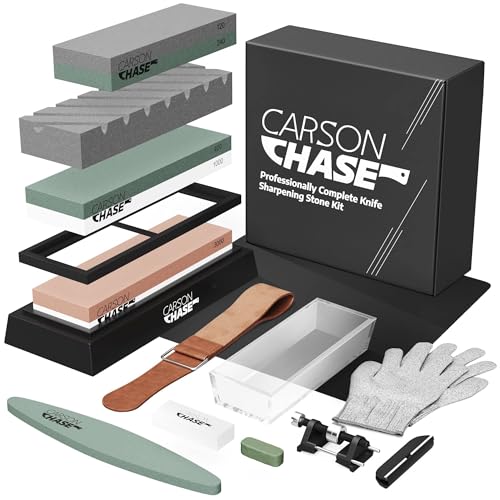
When it comes to sharpening a knife, there are several methods and materials that can be used. One of the most popular and widely used techniques is to use oil as a lubricant during the sharpening process. But why is oil used, and what advantages does it offer?
Firstly, using oil helps to reduce friction between the sharpening stone and the knife blade. This is important because friction can generate heat, which can be detrimental to the knife’s edge. By lubricating the surface with oil, the blade can glide smoothly across the stone without overheating.
Secondly, oil acts as a cleaning agent, removing metal particles and debris that can accumulate on the blade during the sharpening process. This helps to maintain the effectiveness of the sharpening stone and ensures that the blade is properly sharpened.
Benefits of Using Oil to Sharpen a Knife
Using oil to sharpen a knife offers several benefits compared to other sharpening methods. Here are some of the main advantages:
- Reduced friction: When sharpening a knife, friction can cause heat to build up, potentially damaging the blade. By using oil, you can effectively reduce friction and prevent heat from damaging the knife.
- Improved cutting performance: Oil sharpening helps to create a razor-sharp edge on the knife blade. The oil acts as a lubricant, ensuring a smooth sharpening motion and allowing the knife to effortlessly glide through materials when used.
- Protects against rust: Oil acts as a protective barrier that helps prevent the knife from rusting. By regularly applying oil during the sharpening process, you can prolong the lifespan of your knife and maintain its overall quality.
- Easy to use: Using oil to sharpen a knife is a simple and straightforward process. All you need is some sharpening oil and a sharpening stone or rod. Apply a few drops of oil to the stone or rod, and then proceed with sharpening the knife as usual.
- Long-lasting results: When you use oil to sharpen a knife, the results tend to last longer compared to other methods. This means you won’t have to sharpen your knife as frequently, saving you time and effort in the long run.
Overall, using oil to sharpen a knife offers a range of benefits, including reduced friction, improved cutting performance, rust protection, ease of use, and long-lasting results. By incorporating oil into your sharpening routine, you can ensure that your knife remains sharp, efficient, and durable for years to come.
Improved Cutting Performance
Using oil to sharpen a knife not only helps to maintain its edge, but it also greatly improves its cutting performance. When a knife is properly lubricated with oil, it reduces friction between the blade and the material being cut. This allows the knife to glide through the material with ease, resulting in cleaner and more precise cuts.
Oil acts as a barrier between the blade and the material, preventing the accumulation of residue or debris on the knife. This is especially beneficial when cutting sticky or starchy substances, such as meats, vegetables, or fruits. The oil prevents these substances from sticking to the blade, ensuring a smoother cutting experience and minimizing the need for constant cleaning or wiping during use.
Furthermore, the use of oil helps to preserve the sharpness of the blade for a longer period of time. As the oil reduces friction, it prevents the blade from becoming dull or damaged during the cutting process. This means that the knife will maintain its edge for a longer period, resulting in fewer sharpening sessions and a longer lifespan for the knife.
Reduced Wear and Tear
Regular use of oil during the sharpening process also helps to reduce wear and tear on the knife. By providing a lubricated surface, the oil minimizes the chances of the blade chipping, cracking, or bending during use. Additionally, it helps to prevent the build-up of heat on the blade, which can cause the metal to warp or lose its temper.
The reduced wear and tear not only extends the life of the knife but also ensures that it remains in good working condition. By maintaining the blade’s structural integrity, the knife will continue to provide efficient cutting performance over time, without the need for frequent repairs or replacements.
Enhanced Safety
Using oil to sharpen a knife also enhances safety during use. A dull or damaged blade can be hazardous, as it is more likely to slip or veer off course while cutting. By ensuring that the blade is sharp and in optimal condition, the use of oil reduces the risk of accidents and injuries.
Additionally, the smoother cutting experience achieved with an oiled blade requires less force and effort from the user. This reduces the strain on the hand and wrist, making it easier and more comfortable to handle the knife for extended periods.
In conclusion, the use of oil during knife sharpening not only improves its cutting performance but also reduces wear and tear, enhances safety, and prolongs the knife’s lifespan. By incorporating this simple step into your knife maintenance routine, you can enjoy the benefits of a sharp and efficient cutting tool for years to come.
Enhanced Blade Durability
Using oil to sharpen a knife is not only important for maintaining a sharp edge, but it also contributes to enhanced blade durability. When you sharpen a knife without using any lubricant, the metal on the blade can become excessively heated. This high temperature can cause the blade to lose its temper, making it more prone to chipping and breaking.
By using oil during the sharpening process, you create a thin layer of lubrication between the sharpening stone and the blade. This helps to dissipate heat and prevent the metal from getting too hot, thus preserving the blade’s temper. Additionally, the oil helps to flush out any metal particles or debris that may accumulate on the stone during sharpening, ensuring a cleaner and more effective sharpening process.
Furthermore, the presence of oil on the blade helps to reduce friction, allowing the blade to glide more smoothly through materials during use. This reduced friction not only makes cutting tasks more efficient, but it also reduces the amount of wear and tear the blade experiences. As a result, the blade can maintain its sharpness and durability for a longer period of time, allowing you to enjoy the benefits of a well-maintained knife.
Protection Against Corrosion
One of the primary reasons for using oil to sharpen a knife is to protect it against corrosion. Corrosion, also known as rust, can occur when the metal blade of a knife is exposed to moisture or oxygen for extended periods of time.
When you apply a thin layer of oil to the blade, it creates a barrier between the metal surface and the surrounding air or water. This barrier helps to prevent the formation of rust by inhibiting the oxidation process.
Additionally, oil can help to remove any existing rust or corrosion from the blade. By applying oil and gently scrubbing the surface with a soft cloth or brush, you can help to loosen and remove any rust particles that may have formed.
It is important to note that not all oils are suitable for knife maintenance. Vegetable oils, for example, can turn rancid and leave a sticky residue on the blade. It is recommended to use a high-quality mineral oil or a specialized knife oil that is specifically designed for corrosion protection.
Regular oiling and maintenance can help to prolong the life of a knife by preventing the damaging effects of rust and corrosion. By keeping the blade clean and well-oiled, you can ensure that it remains sharp and in optimal condition for years to come.
| Benefits of using oil to sharpen a knife: |
|---|
| 1. Protection against corrosion |
| 2. Lubrication for smooth cutting |
| 3. Enhanced edge retention |
| 4. Gradual wear of the abrasive material |
| 5. Ease of sharpening |
Easier Sharpening Process
Using oil to sharpen a knife offers several advantages that make the sharpening process easier and more effective.
1. Lubrication
When you apply oil to the surface of the knife blade and the sharpening stone, it acts as a lubricant. This reduces friction between the two surfaces, allowing the knife blade to glide smoothly over the stone. As a result, you can maintain a consistent angle and achieve a more even and precise sharpening.
2. Cooling
Sharpening a knife generates heat due to the friction between the blade and the stone. This heat can affect the temper of the metal and compromise the knife’s hardness and durability. By using oil during the sharpening process, you can dissipate this heat and prevent any potential damage to the blade. The oil acts as a coolant and helps to maintain the optimal temperature, ensuring that the knife remains in its best condition.
Overall, using oil when sharpening a knife provides a smoother and more controlled sharpening process. It helps to reduce friction, maintain a consistent angle, and prevent heat damage to the blade. This makes sharpening easier and more effective, allowing you to achieve a razor-sharp edge on your knife.






